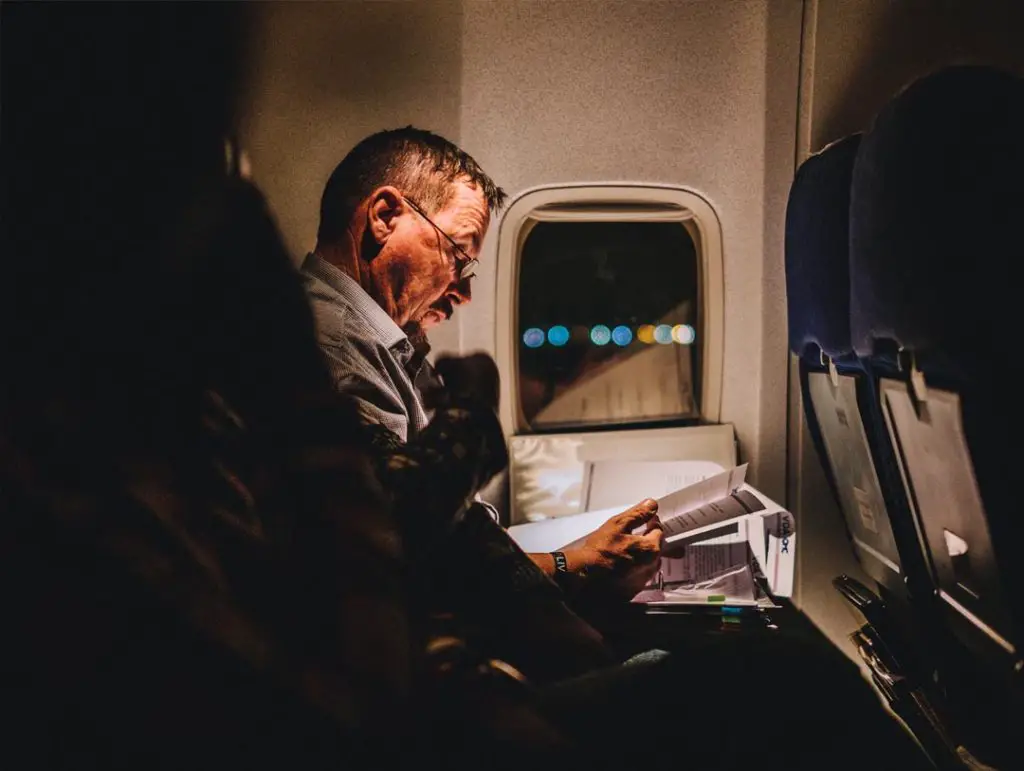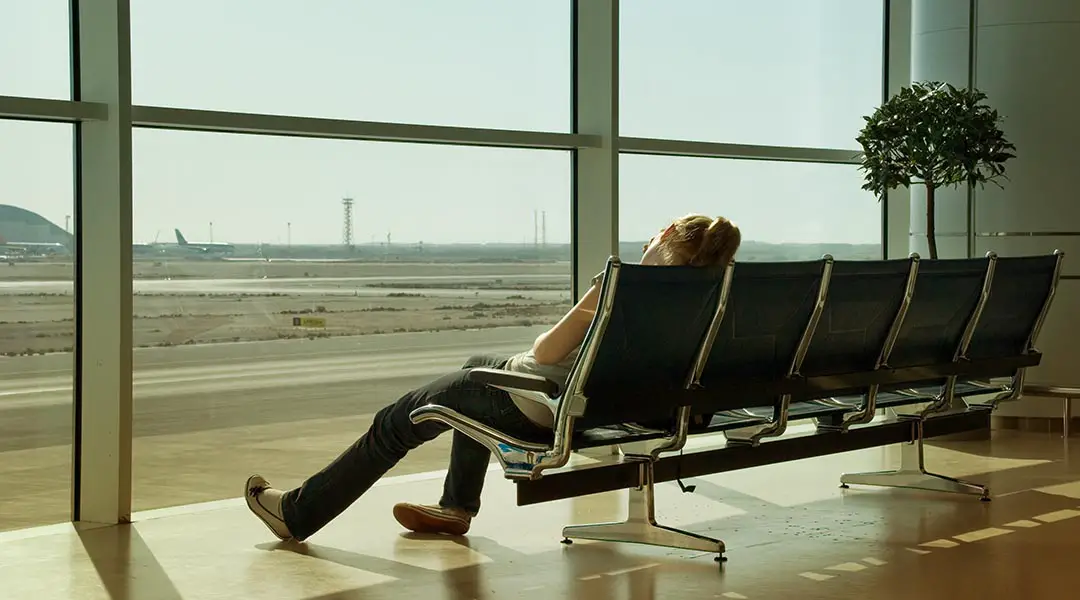I’m not a huge globe trotter, but talking about lengthy flights with a friend who went from Europe to Chili, we spoke about the fact that they ate constantly during the trip. But what would happened if you didn’t eat at all during a long flight?
Fasting can have a big impact on jet lag, even getting rid of it altogether. The way you eat when changing time zones will affect how you feel during and after the flight. Jet lag diets exist, always promoting some type of fasting. But keeping with plain fasting for 16 to 24h can already reduce jet lag drastically.
Everyone knows how jet lag affects you, but what exactly changes when you’re fasting? Eating is a great way to keep your mind busy on a flight, but maybe what I’m about to tell you will make you reconsider.
How does fasting help prevent jet lag
Everyone knows the dreaded effects of jet lag: fatigue, irritability, headaches, some claims it takes you a full day to recover for each time zone crossed. There are many factors that can increase or decrease the effect of jet lag on you: your sleeping habits, whether you’re going east or west or the way you eat.
Jet lag is caused simply by a disruption of the circadian rhythms in the human body. Circadian rhythms, also called the body clock, are 24-hour cycles in the physiological, biochemical and behavioral processes of the body. It regulates daily activities like sleep, body temperature regulation, waking up and, you got it, eating.
Our body has an internal time-keeping system. This system is heavily influenced by the light and dark cycle of night and day. Traveling many time zones and going through night and day in an unnatural manner is a sure way to disrupt your body clock. Resulting in jet lag.
But what’s more interesting is that if night/day cycles have a big effect on your internal body clock, it seems like the way you eat has an even bigger effect. In fact, it seems that food habits, more specifically the lack of food, can resynchronize body rhythms faster than light and dark.
This theory comes from a study called Differential Rescue of Light- and Food-Entrainable Circadian Rhythms conducted by Dr. Clifford B. Saper and his colleagues, at the Beth Israel Deaconess Medical Center in Boston.
They studied mice for this and found that a second body clock in mice organisms, that seems to take over when food is scarce. Okay, we’re not mice, but we share with them a dorsomedial nucleus that responds to hunger. And this alternate body clock is located in the dorsomedial nucleus.
The scientists think that food is as important to survival as sleep. Hunger could then influence the circadian rhythm as much as changes in the day/night cycles.

Basically, depriving your body of food could effectively put the circadian clock on hold, which will come back to life with food. This presumably comes from the prehistoric age, when our body needed to be fully functioning and awake in order to hunt for food when it was scarce.
16h to 24h fast means you could then start fasting before taking your flight, depending on the length of the trip. The idea is to prevent from eating, before, during and a bit after the trip. Of course, during all this time, it is crucial that you drink as much water as you can, even if you end up spending your flight in the loo.
You should try to eat as close to your normal eating habits. Let’s say you land at 4 pm, ideally, you should wait until 6 to 7 pm to eat (your standard eating time) in order to resynchronize your circadian rhythm.
No studies have been done on humans for now, but Dr. Clifford B. Saper received many letters of people who fasted during a trip and didn’t experience jet lag. You can even find testimonies on the web about this.
Why not give it a try? I know, trips are such a pain, not eating (or drinking alcohol to doze off) during a long flight can be really hard. But there are some things you can do to reduce the hustle.
5 tips to help you fast on a lengthy flight
When flying long distances, everything can become a pain in the ass. A crying baby, a snoring dude next to you, the everlasting occupied toilets, etc.
Why adding insult to injury by preventing you from eating and drinking? They can be a great help to help you go through the trip. But if jet lag really affects you, trying to fast can be a great idea.
Here are some tips to help you get through a long-distance fasting flight with flying colors.
#1 Have enough water on hand
You know the drill if you experimented with fasting, drinking water constantly is not an option. Water drinking helps you cope with hunger, it keeps your body hydrated and reduces your appetite.
I know coffee is also a great way to keep hunger away, but it wouldn’t help with sleeping the flight through obviously. You could try herbal teas instead which doesn’t contain caffeine.
#2 Tell your situation to the flight attendants
You’re constantly going to be bothered by nice attendants asking what type of meal do you want, proposing you a snack, etc. Try and be clear with them upfront, without being rude of course. You’re not going to eat or drink soda or alcohol during the flight. So, just don’t ask.
That way you won’t get woken up to choose your meal, have an apple or drink a digestive with your coffee.
#3 Keep busy
That’s an obvious one, but don’t get to the plane empty-headed. Take a book, some work, anything that might occupy your mind. Don’t just count on good movies and tv shows, that can grow old pretty fast.
You can also try to speak with the people next to you (friends or not), engage, play games. And when you’re tired of socializing, put big, noise-reducing headphones on and try and get some sleep.
#4 Sleep. Duh.
I know, easier said than done. Don’t force yourself into sleep, as I said, keep busy as long as you don’t feel tired. But when you start feeling drowsy, try and get some sleep.
On that subject, it might be better to try and fit your sleep into your natural rhythms if traveling by night. Not forcing yourself into naps at any time during the day. Sleeping the whole way might not help your body clock.
#5 Sleeping pills. Maybe?
Well, this one might not be such great advice, since it could also lead to deregulating your circadian rhythm furthermore. But there are no counter-indications that I know of about sleeping pills and fasting.
So you could use one to help you sleep, but keep in mind it won’t be natural, healthy sleep and it might defy the purpose of the fasting altogether.
Fasting and “Jet Lag Diets” what’s the difference?
You may have also heard of chronobiologist Charles Ehret. He talked of jet lag diet several decades ago. He calls this diet the Argonne Diet, named after the Argonne National Laboratory in Illinois.
The diet is more restrictive than plain fasting on the day of the trip, it starts several days before traveling. The idea is that your body clock could reset faster by a series of feasting and fasting day in the days leading to your departure.
High protein meals will stimulate your body’s active cycle and high carbohydrate meals in the evening will help you sleep. The scientist believes that this alternation of fasting and feasting reduce the liver’s store of glycogen, which prepares the body’s internal clock for resetting to a different time zone.
Here’s a sample of a jet lag diet before a long-distance flight :
- First, determine when breakfast time will be at your destination
- Four days before, stop drinking tea, any caffeinated beverage, and alcohol, except between 3 pm to 5 pm.
- On the first day, prepare for a feast. Eat an Atkins style breakfast (eggs, cheese, meats) and a high carb / low protein dinner (pasta, bread, potatoes).
- Day two is a fasting day: very light meals and no more than 800 calories intake
- Day three fasting day again
- Day four is the day of your departure. Fast again (which means very light meals), avoid caffeine and cut off all alcohol.
- Eat a high protein breakfast upon arriving
I don’t know about you, but even though Ehret might have some valid points, that seems quite hard only to avoid jet lag. You could try it, it has been around for a while and it might certainly work.
But is it any better than a simple 24h fast on the day of the departure? I’m not sure, plus it’s far more restrictive.
Related questions
Are some foods better to prevent jet lag? Eating carbs upon departure could help you sleep on the flight. Berries should prevent dehydration caused by the dry air on the flight, reduce inflammation associated with dehydration and travel and are high in fiber. But the baseline is: it’s more important when you eat than what you eat.
Is it a good idea to drink alcohol to sleep? It can be a pretty efficient way to doze off during a long flight, but any sedative is not recommended on a flight. Since it’s not good healthy sleep it could mess with your circadian rhythm even more. Not even mentioning other ill effects of alcohol.

